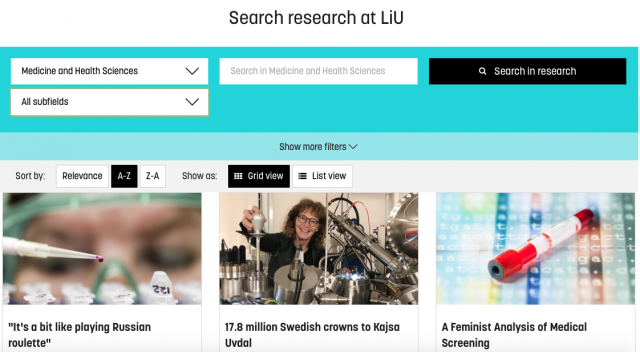November 12, 2020
Finding a Practical Project in the Biomedical Field at LiU
Hello to all of you out there 🙂
Some of you remember me from my old blog which is permanently closed, as I switched to our new platform (this one here). For those who don’t know me – my name is Nada-Katarina and I am a second-year master student in Experimental and Medical Biosciences. Currently out of courses, but working full-time in the lab on my degree project in the immunology&dermatology field.
This small intro is a nice Schlagwort (aka introduction) into today’s blog-post – how to find a practical project if you are a current or prospective biomedical student at LiU?!
The practical project is a mandatory part of the degree undertaken during both years of the master’s either separately or together with other courses. The project itself can be taken as 15 or 30 credits and it can be in any field of your interest (as long as your mentor approves it).
Since I successfully wrapped up my 1st-year project (30 credits) and I am currently in the middle of my degree project (30 credits) I will try to give you everything I’ve learned on my journey related to this topic. If you are a first-year student, you can start with your practical project as soon as you are done with two mandatory courses taught at the beginning of the first year. My advice is to start looking for your project as soon as possible (or at least familiarise yourself with various research groups here at LiU). Do not wait until you are done with your courses, because finding a good position in a group can be time-consuming and tiring.
Another important point is a slender idea in which direction you are willing to go – meaning it is good to know which field interests you (immunology, cancer, pharmacology, stem cells, reg.medicine, dermatology, bioinformatics, genetics, etc.). It is good to keep in mind that the field in which you are going to work is the one that interests you, but the scope of your project can be something completely different, therefore conversation between your future supervisor and you is crucial here.

Where to look for the project(s)? Everywhere! On the LiU webpage and the main page of various departments. I don’t think there is a web-page listing all available positions, therefore good old web-browsing can be handy here (it is about the process – not the destination 😉 ). You will have to send each group/person a mail showing your interest in their work. I remember I have sent three emails to the groups working in the immunology and neurobiology field and I got a reply from two of them.

Do you need a CV? From my experience – no. I was aware that researchers are pretty busy, in their own world and that this is not an ordinary work-position, therefore I improvised and created a hybrid. A hybrid email made of a short introduction about myself, my previous work, the main reasons why I want to join their group, and what I can offer in return. Make sure you know your WHY’s, what are your motives, and what you want from that specific experience.
Will you find your position immediately? Probably not, but I know few people who managed that from the first attempt. Some people took a month or two to find something, some of them found their project after 2-3 weeks. It really depends to whom you are sending the email, how busy they are, and if there is actually available position and work to do for you.
To whom should you send an email? I would suggest to the group leader since that person has a real insight into everything that is happening in his/her group – from available positions ‘till finances.
How persistent and persuasive I have to be? If you want something – fight for it but also know when it’s time to back off and try something else. If you don’t receive a reply to your email it is okay to send another one. If you do not get a reply to your second email it is the same situation as in unreturned love – no answer is still an answer! Move on and find something better 🙂
Nada-Katarina, Serbia
Experimental & Medical Biosciences



